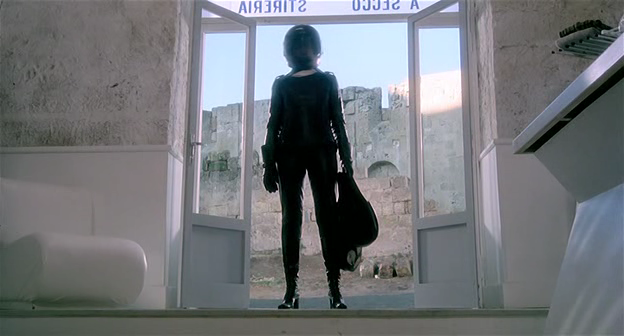
"When a director dies, he becomes a cinematographer." That softly devastating one-liner, initially applied, I believe, to Josef von Sternberg, perhaps comes from a prejudice against the purely visual and formal elements of film, a feeling that they should never be allowed to dominate the dramatic elements, the plot and performances. But what about directors who started life as cinematographers?
Carlo Di Palma, best known for his shiny, cool, hypnotic work with Antonioni in the sixties and after, and for a long string of Woody Allens in the eighties and nineties, directed only a few films. Blonde in Black Leather (1975), his second, offers clues as to why, as well as making one regret that he wasn't more prolific. Co-written with Barbara Alberti & Amedeo Pagani (who previously collaborated on The Night Porter), it's a female buddy road movie with one foot in the western genre, another in the gangster flick, and an anatomically third foot in the pop-art comedy European arthouse world of Joseph Losey's Modesty Blaise, whose star, Monica Vitti, is the titular blonde.
Adding to the resemblance to the later and more staid Thelma and Louise, Vitti is given a sidekick, played by Claudia Cardinale. What you might call an uneasy balance is maintained between the film's satiric expose of the travails of being a woman in a man's world, and the filmmaker's eye for female beauty as seen encased in tight leather or draped in loose wool.

We're introduced to Vitti encased in said leather catsuit, face masked by a black visor, riding into town to the backing of Riz Ortolani's score, and the spaghetti western feeling is pretty pungent. Cardinale is working in a laundry, which means steam and a white uniform damp with sweat, also a sleazy boss who feels her up while reading porno mags. Even by male chauvinist pig standards, that seems like over-egging the pudding. Vitti arrives as a model of devil-may-care independence and Cardinale soon drops everything to join her on the road, but Vitti is not all she seems...
What follows is frustratingly slight at times, outrageously funny at others, and spectacularly beautiful to look at always. Vitti turns out to be a flaky fantasist whose life story is cobbled together from movies she's seen. Cardinale, somehow, takes these tales of adventuring with Butch and Sundance at face value, and is only gradually disillusioned by Vitti's inability to follow through on her super-heroic image. But whenever the girls get into a real scrape, the film's fantasy side kicks in to deus ex machinate them out of trouble. I was reminded of Richard Lester's theory about why Baron Munchausen couldn't be made to work as a movie: "There's a great difficulty in sustaining audience interest when you've got a madman as hero not responding to plot conditions." Vitti's defiance of the laws of physics and narrative, plus the fact that she gets away with it, results in a storyline that never really grips, but the constant variety of landscape, characters and gags provided by the road movie form means that Di Palma can just about get away with this.

1) While Cardinale has her entire wardrobe unraveled and magically re-knitted into an entirely new get-up, Vitti undertakes an orgasmic polishing of her entire leather-clad form. This takes, like, a really long time.
2) A marathon gambling session in a casino out of 20s Chicago transforms into a Terence Hill mass punch-up, with Cardinale somehow taking on all comers.
3) A chase along the roof of a train switches to black and white, then to silent movie with superimposed intertitles, before the heroines land in the river and dry themselves off in a rustic scene modeled on Henri Rousseau.
Until finally Vitti's true origins are revealed, as down-to-earth and depressing as Cardinale's, and the film must finally choose between fantasy and reality. Well, which would you choose?

***
The Forgotten is a regular Thursday column by David Cairns, author of Shadowplay.